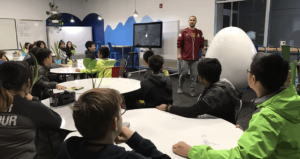Jim Shelton: Asst Dep Sec Innovation & Improvement, DOE
It’s unlikely that federal authorities can get the additional funding they’ve asked for to address dropout prevention and dropout factory turnarounds in 2011, according to Jim Shelton, Assistant Deputy Secretary for Innovation and Improvement at the US DOE. He spoke with edReformer this morning in a quick interview about a week after the release of the Digital Learning Council’s digital learning recommendations for governors and policy makers.
Dropout recovery seems to be, on a state level, something that either gets a strong focus, or a less than strong focus. I asked what is the federal government doing to encourage an ambitious approach to dropout recovery, especially in states that have both highly populated urban environments and a budget deficit issue.
Shelton said: “The first thing is that our primary emphasis on dropouts is dropout prevention.” He said that the Department is channeling funds to dropout factories to help in their turning around, and by doing so, “We can knock out fifty precent of the dropout crisis in the country. We have asked for some additional funds in the coming year — and I’m not sure if that is going to happen — to help states build out their capacity around dropouts.”
No surprise that on the first question of what the feds’ back up plan is for re-authorization of ESEA, there was not much in the way of an answer. Secretary Arne Duncan has already said that he will be spending 99.99% of his time on trying to push this through. Shelton said: “The backup plan is that we have had the fortunate opportunity with [a bunch of new programs like RttT]…to shape them, to pursue the priorities that we have already laid out. The good news is that the states are driving the work around common core standards. They are the leaders. We are able to put out the Rttt and that work is going to continue without additional funding from us.”
Then I asked about standards for tech, research and development and software, where, if you are in the vendor business, or an entrepreneur trying to dream up something to solve an education problem in our system, you encounter a wildly disparate set of standards. Here is the question, and his answer:
In terms of research and development, is the federal government doing anything to develop standards, or to facilitate the adoption of standards
for the research and development of software, digital learning strategies, or devices that specifically address engagement, performance and assessment of students?
He replied:
Yes. What we’re trying to do is get the industry to come together and develop better interoperability standards and leverage the folks that are already out there, who are doing these things well. That is what the Federal Registry initiative is about.
And in response to the release of the Digital Learning Council’s Ten Elements of Digital Learning, Shelton said that we are at a “pivotal point” in the development of new standards and ways of learning / teaching. “ I think the focus and the opportunity is not only timely, it’s absolutely essential. We have a very short window to make this pivot. I think the leadership that Governors Bush and Wise have provided shows that it is actually a bipartisan issue and it’s something we should be able to make progress on in a timely manner.”
Related articles
- Video: Jim Shelton, Deputy Asst. Sec., DOE (edreformer.com)
- Report: ‘Dropout factories’ on decline in US (seattletimes.nwsource.com)
- Sec. of Education Arne Duncan: “ESEA a Priority” (edreformer.com)
- Report: ‘Dropout Factories’ On The Decline In America (huffingtonpost.com)
- Less Fed With Your Ed? (edreformer.com)







0 Comments
Leave a Comment
Your email address will not be published. All fields are required.